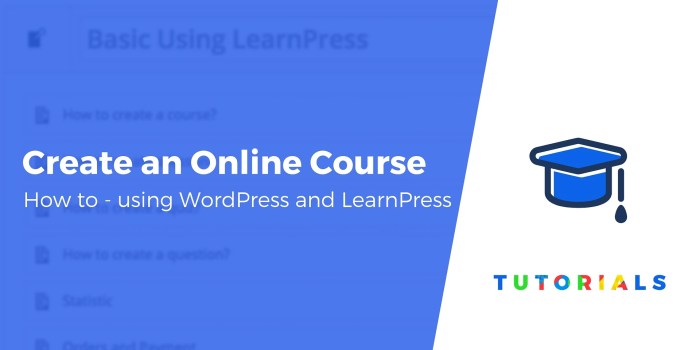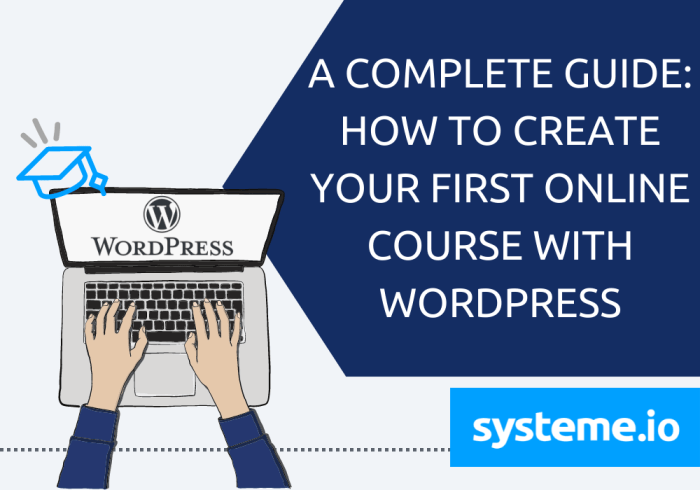Launching your own online course can be incredibly rewarding, offering the potential to reach a global audience and share your expertise. WordPress, with its flexibility and extensive plugin ecosystem, provides an ideal platform to build a professional and engaging online course website. This comprehensive guide will walk you through the process, from initial setup to marketing and beyond. We’ll cover everything you need to know to create a successful online learning platform.
Choosing the Right WordPress Hosting and Domain Name
Before diving into the design and development, you need a solid foundation. Selecting the right web hosting and domain name is crucial for your online course website’s performance and branding.
Choosing a Reliable Web Host
- Performance: Opt for a host with excellent uptime and fast loading speeds. Slow loading times can lead to high bounce rates and frustrated learners. Look for providers specializing in WordPress hosting, as they often offer optimized servers and caching solutions.
- Security: Your website needs robust security to protect student data and prevent unauthorized access. Choose a host with features like SSL certificates, regular backups, and firewall protection.
- Scalability: As your course grows, your hosting needs will likely increase. Select a provider that offers easy scaling options to accommodate more students and content.
- Support: Reliable customer support is invaluable, especially when you encounter technical issues. Look for hosts with 24/7 support options via phone, email, or live chat.
Popular WordPress hosting providers include SiteGround, Bluehost, WP Engine, and Kinsta. Each offers various plans to suit different budgets and needs. Research their features and pricing before making a decision.

Source: optimole.com
Selecting a Memorable Domain Name
Your domain name is your online identity. Choose a name that is:
- Relevant: Reflects the subject matter of your course.
- Easy to remember: Short, memorable, and easy to spell.
- Available: Check if the domain name is available using a domain registrar like GoDaddy, Namecheap, or Google Domains.
- Brandable: Creates a strong brand identity for your online course.
Installing WordPress and Essential Plugins
Once you have your hosting and domain name, it’s time to install WordPress. Most hosting providers offer one-click WordPress installation, simplifying the process significantly. After installation, you’ll need to install essential plugins to enhance your online course website’s functionality.
Essential Plugins for Online Courses
- Learning Management System (LMS) Plugin: This is the core of your online course website. Popular options include LearnDash, LifterLMS, and Sensei. These plugins allow you to create and manage courses, lessons, quizzes, and assignments. They often include features for drip-feeding content, progress tracking, and certificates of completion.
- Page Builder Plugin: Page builders like Elementor, Beaver Builder, or Divi simplify website design, allowing you to create visually appealing pages without coding. They offer drag-and-drop interfaces and pre-built templates.
- Security Plugin: Wordfence or Sucuri Security are excellent choices for bolstering your website’s security. They provide features like malware scanning, firewall protection, and login security.
- Caching Plugin: WP Super Cache or W3 Total Cache improve website speed by caching content. Faster loading times enhance user experience and .
- Plugin: Yoast or Rank Math help optimize your website for search engines, increasing visibility and attracting more students.
Designing Your Online Course Website
With WordPress and essential plugins installed, you can start designing your online course website. Focus on creating a user-friendly and visually appealing experience for your students.
Key Design Considerations
- Intuitive Navigation: Ensure students can easily find the course content, their progress, and other important information.
- Responsive Design: Your website should look great on all devices (desktops, tablets, and smartphones).
- Professional Branding: Use consistent branding elements (logo, colors, fonts) to create a professional image.
- High-Quality Content: Invest in creating engaging and high-quality course materials, including videos, text, and interactive elements.
- Clear Call to Actions (CTAs): Guide students through the learning process with clear CTAs, such as “Start Course,” “Next Lesson,” or “Enroll Now.”
Creating and Managing Your Online Courses
Using your chosen LMS plugin, you can create and manage your online courses. This typically involves structuring your course into modules, lessons, and quizzes. Consider using a variety of media formats to keep students engaged.
Structuring Your Course
- Course Overview: Provide a clear introduction to the course, outlining its objectives and learning outcomes.
- Modular Approach: Break down your course into smaller, manageable modules, each focusing on a specific topic.
- Varied Content Formats: Use a mix of videos, text, images, and interactive elements to cater to different learning styles.
- Assessments and Quizzes: Include quizzes and assignments to test student understanding and track their progress.
- Community Features: Consider adding forums or discussion boards to foster interaction among students.
Marketing Your Online Course Website
Once your website is live, you need to attract students. Effective marketing is essential for the success of your online course.
Marketing Strategies
- Search Engine Optimization (): Optimize your website and course content for relevant s to improve search engine rankings.
- Social Media Marketing: Promote your course on social media platforms like Facebook, Twitter, and Instagram.
- Email Marketing: Build an email list and send out newsletters and promotional emails to potential students.
- Paid Advertising: Consider using paid advertising platforms like Google Ads or Facebook Ads to reach a wider audience.
- Affiliate Marketing: Partner with other influencers or websites to promote your course.
Frequently Asked Questions (FAQ)
- Q: What is the best LMS plugin for WordPress? A: There’s no single “best” plugin. The ideal choice depends on your specific needs and budget. LearnDash, LifterLMS, and Sensei are all popular and feature-rich options.
- Q: How much does it cost to create an online course website? A: Costs vary greatly depending on hosting, plugins, design, and marketing efforts. You can start with a relatively low budget, but expect costs to increase as your course grows.
- Q: Do I need coding skills to create an online course website? A: No, you don’t need coding skills. WordPress and its plugins make it possible to create a professional website without coding knowledge.
- Q: How can I promote my online course? A: Utilize a multi-faceted marketing strategy encompassing , social media, email marketing, and potentially paid advertising.
- Q: How do I handle student payments? A: LMS plugins often integrate with payment gateways like PayPal or Stripe, allowing you to securely process payments.
Conclusion
Creating a successful online course website with WordPress is achievable with careful planning and execution. By following the steps Artikeld in this guide, you can build a platform that effectively delivers your course content, engages your students, and helps you achieve your educational goals. Remember to continuously evaluate and improve your website based on student feedback and performance data.
Call to Action
Ready to transform your expertise into a thriving online course? Start building your dream online learning platform today! Choose your hosting, select your plugins, and begin creating engaging content. The journey to online education success starts now!
Query Resolution
What hosting providers are best for WordPress course websites?
Several providers excel, including SiteGround, Bluehost, and WP Engine. Consider factors like speed, security, and customer support when choosing.
Which WordPress themes are ideal for online courses?
Many themes are specifically designed for education. Look for themes with features like course listing capabilities, lesson management, and integration with learning management system (LMS) plugins.

Source: cloudfront.net
How do I handle payments for my online courses?
Popular payment gateway integrations include PayPal, Stripe, and WooCommerce Payments. Choose a gateway that aligns with your business needs and geographical location.
What are some essential plugins for an online course website?
Essential plugins include an LMS plugin (LearnDash, LifterLMS, or Teachable), a membership plugin, and an email marketing plugin.